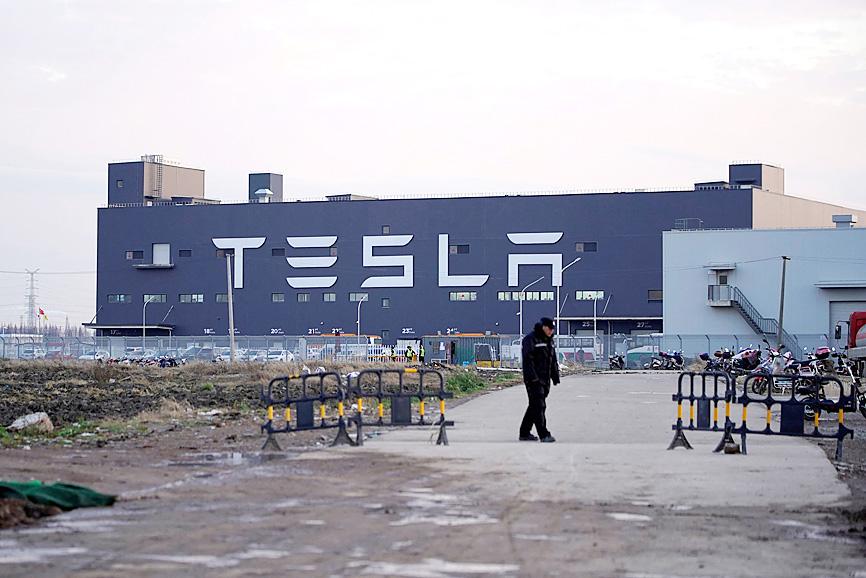Tesla Inc’s deliveries of electric vehicles fell in the second quarter of this year compared with the first quarter due mainly to a weeks-long closure of its factory in China, the company said on Saturday.
Tesla delivered 254,695 vehicles from April to last month, it said in a statement.
That was 27 percent more than in the first quarter of last year, but down 18 percent from the January-to-March quarter and the first such decline in more than two years.

Photo: Reuters
This marks a disappointment for a company that says it is posting strong growth, touting the opening of two new factories this year, in Germany and Texas.
The drop in deliveries was bigger than anticipated by analysts, who had expected 264,000 vehicles to be handed over to buyers, data compiled by FactSet Research Systems Inc showed.
Tesla in April said that supply chain snarls hitting the auto industry in general would keep disrupting the company’s production until the end of the year.
However, it delivered a record number of vehicles in the first quarter.
In the second quarter, Tesla had to grapple with the closure of its Shanghai factory for several weeks because of strict lockdown measures due to a surge in COVID-19 cases.
In its statement on Saturday, the company said it produced 258,000 vehicles in the second quarter, “despite ongoing supply chain challenges and factory shutdowns beyond our control.”
It also said last month was the highest vehicle production month in Tesla’s history.
Elsewhere in the industry, General Motors Co (GM), Toyota Motor Corp and other automakers in the second quarter suffered a hit to US sales, as supply chain woes continued to crimp inventories, results released on Friday showed.
GM sold 582,401 vehicles in the three months ending Thursday, a drop of 15 percent from the same period last year.
The Michigan-based company said it is holding 95,000 partly built vehicles in need of components that it expects to deliver by the end of this year.
Meanwhile, Toyota reported sales of 531,105 vehicles over the same period, a drop of 23 percent compared with the second quarter of last year.
The Japanese firm also cited “ongoing inventory challenges” hindering its dealerships.

CHIP WAR: Tariffs on Taiwanese chips would prompt companies to move their factories, but not necessarily to the US, unleashing a ‘global cross-sector tariff war’ US President Donald Trump would “shoot himself in the foot” if he follows through on his recent pledge to impose higher tariffs on Taiwanese and other foreign semiconductors entering the US, analysts said. Trump’s plans to raise tariffs on chips manufactured in Taiwan to as high as 100 percent would backfire, macroeconomist Henry Wu (吳嘉隆) said. He would “shoot himself in the foot,” Wu said on Saturday, as such economic measures would lead Taiwanese chip suppliers to pass on additional costs to their US clients and consumers, and ultimately cause another wave of inflation. Trump has claimed that Taiwan took up to

A start-up in Mexico is trying to help get a handle on one coastal city’s plastic waste problem by converting it into gasoline, diesel and other fuels. With less than 10 percent of the world’s plastics being recycled, Petgas’ idea is that rather than letting discarded plastic become waste, it can become productive again as fuel. Petgas developed a machine in the port city of Boca del Rio that uses pyrolysis, a thermodynamic process that heats plastics in the absence of oxygen, breaking it down to produce gasoline, diesel, kerosene, paraffin and coke. Petgas chief technology officer Carlos Parraguirre Diaz said that in

Japan intends to closely monitor the impact on its currency of US President Donald Trump’s new tariffs and is worried about the international fallout from the trade imposts, Japanese Minister of Finance Katsunobu Kato said. “We need to carefully see how the exchange rate and other factors will be affected and what form US monetary policy will take in the future,” Kato said yesterday in an interview with Fuji Television. Japan is very concerned about how the tariffs might impact the global economy, he added. Kato spoke as nations and firms brace for potential repercussions after Trump unleashed the first salvo of

SUPPORT: The government said it would help firms deal with supply disruptions, after Trump signed orders imposing tariffs of 25 percent on imports from Canada and Mexico The government pledged to help companies with operations in Mexico, such as iPhone assembler Hon Hai Precision Industry Co (鴻海精密), also known as Foxconn Technology Group (富士康科技集團), shift production lines and investment if needed to deal with higher US tariffs. The Ministry of Economic Affairs yesterday announced measures to help local firms cope with the US tariff increases on Canada, Mexico, China and other potential areas. The ministry said that it would establish an investment and trade service center in the US to help Taiwanese firms assess the investment environment in different US states, plan supply chain relocation strategies and